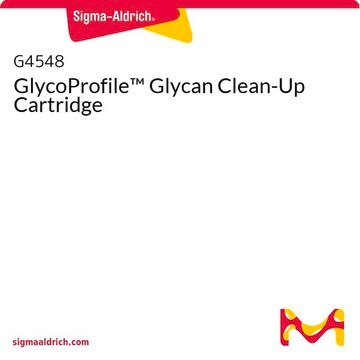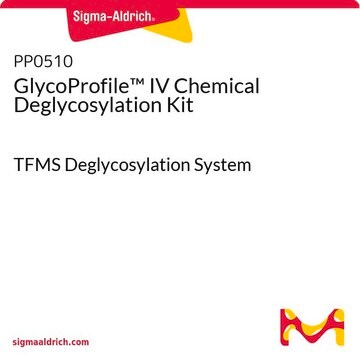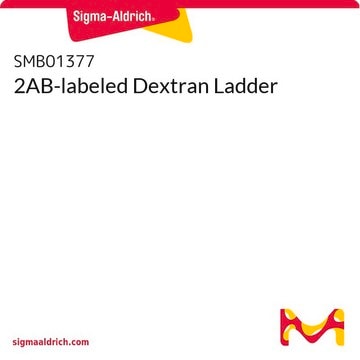PP0520
GlycoProfile™ 2-AB Labeling Kit
Synonym(s):
2-AB Labeling Kit
About This Item
Recommended Products
General description
Application
Legal Information
Kit Components Only
- 2-AB Labeling Reagent 2 x 5
- Dimethyl sulfoxide (DMSO) 2 x 350
- Acetic acid, glacial 2 x 200
- Reductant (sodium cyanoborohydride) 2 x 6
Signal Word
Danger
Hazard Statements
Precautionary Statements
Hazard Classifications
Acute Tox. 2 Dermal - Acute Tox. 2 Inhalation - Acute Tox. 2 Oral - Aquatic Acute 1 - Aquatic Chronic 1 - Eye Dam. 1 - Flam. Sol. 1 - Skin Corr. 1A - Water-react 1
Supplementary Hazards
Storage Class Code
4.3 - Hazardous materials which set free flammable gases upon contact with water
Certificates of Analysis (COA)
Search for Certificates of Analysis (COA) by entering the products Lot/Batch Number. Lot and Batch Numbers can be found on a product’s label following the words ‘Lot’ or ‘Batch’.
Already Own This Product?
Find documentation for the products that you have recently purchased in the Document Library.
Customers Also Viewed
Articles
Glycoprofile Labeling Kits efficiently label glycans for glycan analysis, offering flexibility in choice of labeling.
Glycoprofile Labeling Kits efficiently label glycans for glycan analysis, offering flexibility in choice of labeling.
Glycoprofile Labeling Kits efficiently label glycans for glycan analysis, offering flexibility in choice of labeling.
Glycoprofile Labeling Kits efficiently label glycans for glycan analysis, offering flexibility in choice of labeling.
Protocols
Uncover how HPLC analysis of glycans helps researchers analyze glycan structures and glycoforms & find products to assist in your glycan analysis methods.
Uncover how HPLC analysis of glycans helps researchers analyze glycan structures and glycoforms & find products to assist in your glycan analysis methods.
Our team of scientists has experience in all areas of research including Life Science, Material Science, Chemical Synthesis, Chromatography, Analytical and many others.
Contact Technical Service












